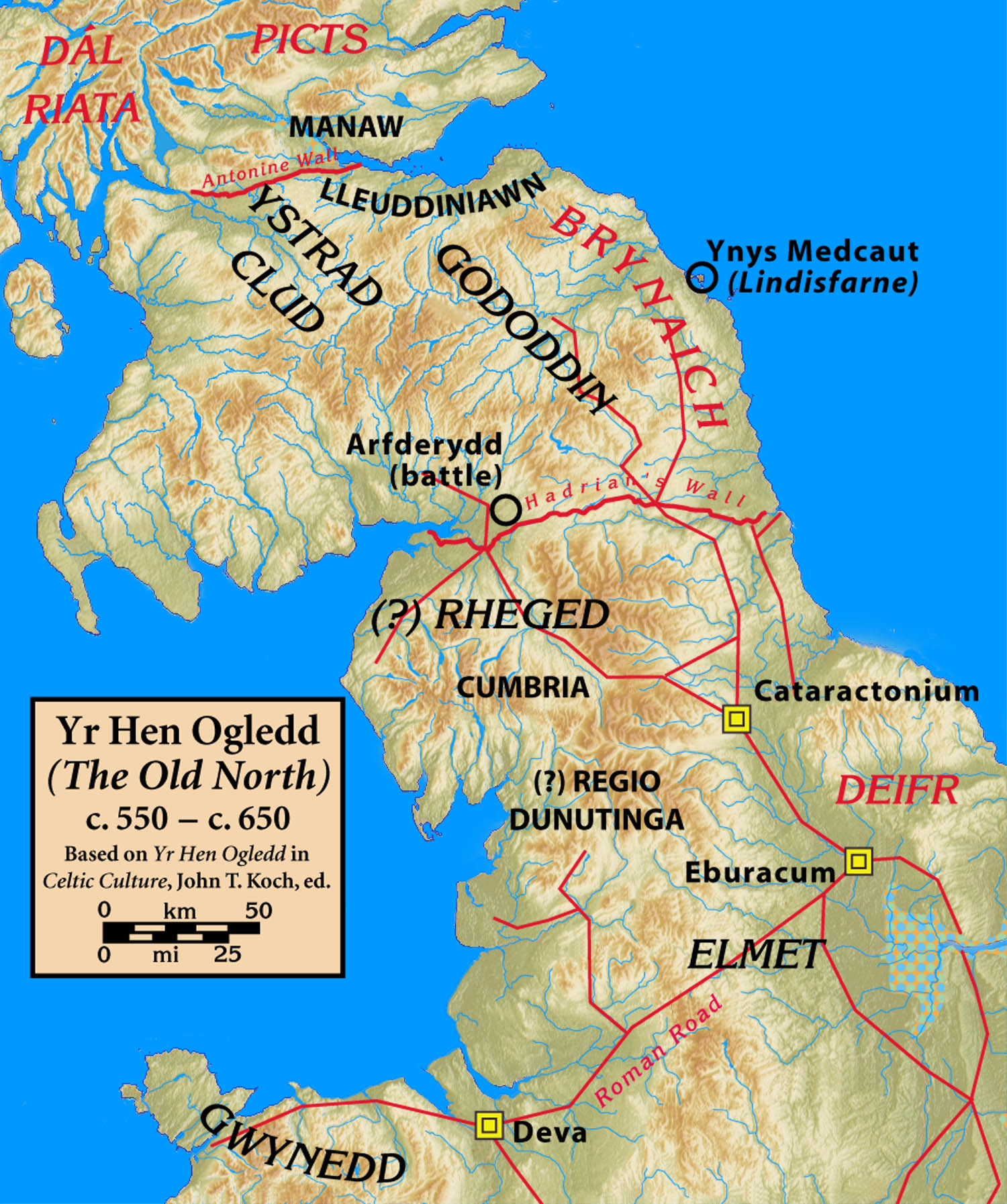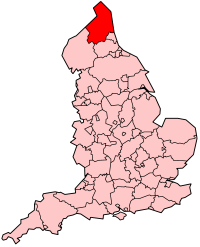|
Glappa Of Bernicia
Glappa of Bernicia ruled from 559 to 560. He was the second known king of Bernicia Bernicia ( ang, Bernice, Bryneich, Beornice; la, Bernicia) was an Anglo-Saxon kingdom established by Anglian settlers of the 6th century in what is now southeastern Scotland and North East England. The Anglian territory of Bernicia was ap .... Little is known of Glappa's life and reign. The earliest authorities differ widely on the order and the regnal years of the kings between the death of Ida (559) and the beginning of Æthelfrith's rule (592/593). Glappa is not named among the sons given his predecessor, Ida, but appears in regnal lists as Ida's successor, reigning one year. External links * 560 deaths Bernician monarchs History of Northumberland 6th-century English monarchs Year of birth unknown {{UK-royal-stub ... [...More Info...] [...Related Items...] OR: [Wikipedia] [Google] [Baidu] |
King Of Bernicia
Northumbria, a kingdom of Angles, in what is now northern England and south-east Scotland, was initially divided into two kingdoms: Bernicia and Deira. The two were first united by king Æthelfrith around the year 604, and except for occasional periods of division over the subsequent century, they remained so. The exceptions are during the brief period from 633 to 634, when Northumbria was plunged into chaos by the death of king Edwin in battle and the ruinous invasion of Cadwallon ap Cadfan, king of Gwynedd. The unity of the Northumbrian kingdoms was restored after Cadwallon's death in battle in 634. Another exception is a period from about the year 644 to 664, when kings ruled individually over Deira. In 651, king Oswiu had Oswine of Deira killed and replaced by Œthelwald, but Œthelwald did not prove to be a loyal sub-king, allying with the Mercian king Penda; according to Bede, Œthelwald acted as Penda's guide during the latter's invasion of Northumbria but withdrew his f ... [...More Info...] [...Related Items...] OR: [Wikipedia] [Google] [Baidu] |
Ida Of Bernicia
Ida () (died c. 559) is the first known king of the Anglian kingdom of Bernicia, which he ruled from around 547 until his death in 559. Little is known of his life or reign, but he was regarded as the founder of a line from which later Anglo-Saxon kings in this part of northern England and southern Scotland claimed descent. His descendants overcame Brittonic resistance and ultimately founded the powerful kingdom of Northumbria. Sources The ''Anglo-Saxon Chronicle'' indicates that Ida's reign began in 547, and records him as the son of Eoppa, grandson of Esa, and great-grandson of Ingwy. Likewise, the ''Historia Brittonum'' calls him as the son of Eoppa and the first king of ''Berneich'' or Bernicia. The ''Anglo-Saxon Chronicle'' elaborates that he ruled for twelve years and built the Bernician capital of Bamburgh Castle. Later, however, the ''Chronicle'' confuses his territory with the later Northumbria, saying that Ælla, historically a king of Deira rather than Bernicia, su ... [...More Info...] [...Related Items...] OR: [Wikipedia] [Google] [Baidu] |
Adda Of Bernicia
Adda (fl. AD 560–568) was the third known ruler of the Anglo-Saxon Kingdom of Bernicia. Adda was one of several sons born to Ida, the first ruler of Bernicia, as was his successor Æthelric. Adda may have been the Bernician commander at the battle of Caer Greu, where the British kings Peredur and Gwrgi of Ebrauc were killed. There is some confusion here because of a conflict between sources. The Annales Cambriae state that the Battle of Caer Greu took place in 580. The evidence for Adda being the Bernician king in question is that the Welsh Triads identify that leader as Ida. Since the sources agree that Ida died in 559, it is assumed that the Triads have named Ida by mistake, and that Adda—the only son with a name similar to Ida's -- was meant. However, the Historia Brittonum ''The History of the Britons'' ( la, Historia Brittonum) is a purported history of the indigenous British ( Brittonic) people that was written around 828 and survives in numerous recensions ... [...More Info...] [...Related Items...] OR: [Wikipedia] [Google] [Baidu] |
Bernicia
Bernicia ( ang, Bernice, Bryneich, Beornice; la, Bernicia) was an Anglo-Saxon kingdom established by Anglian settlers of the 6th century in what is now southeastern Scotland and North East England. The Anglian territory of Bernicia was approximately equivalent to the modern English counties of Northumberland, Tyne and Wear, and Durham, as well as the Scottish counties of Berwickshire and East Lothian, stretching from the Forth to the Tees. In the early 7th century, it merged with its southern neighbour, Deira, to form the kingdom of Northumbria, and its borders subsequently expanded considerably. Brittonic ''Bryneich'' Etymologies Bernicia occurs in Old Welsh poetry as ''Bryneich'' or ''Brynaich'' and in the 9th-century '' Historia Brittonum'', (§ 61) as ''Berneich'' or ''Birneich''. This was most likely the name of the native Brittonic kingdom , whose name was then adopted by the Anglian settlers who rendered it in Old English as ''Bernice'' or ''Beornice'' . ... [...More Info...] [...Related Items...] OR: [Wikipedia] [Google] [Baidu] |
Æthelfrith Of Northumbria
Æthelfrith (died c. 616) was King of Bernicia from c. 593 until his death. Around 604 he became the first Bernician king to also rule the neighboring land of Deira, giving him an important place in the development of the later kingdom of Northumbria. He was especially notable for his successes against the Britons and his victory over the Gaels of Dál Riata. Although he was defeated and killed in battle and replaced by a dynastic rival, his line was eventually restored to power in the 630s. Background Æthelfrith, son of Æthelric and grandson of Ida, apparently succeeded Hussa as king of the Bernicians around the year 592 or 593; Æthelfrith's accession may have involved dynastic rivalry and the exile of Hussa's relatives.Michelle Ziegler,The Politics of Exile in Early Northumbria", ''The Heroic Age'', Issue 2, Autumn/Winter 1999. The genealogies attached to some manuscripts of the ''Historia Brittonum'' say that Æthelfrith ruled Bernicia for twelve years and ruled Dei ... [...More Info...] [...Related Items...] OR: [Wikipedia] [Google] [Baidu] |
Kings Of Bernicia
Bernicia ( ang, Bernice, Bryneich, Beornice; la, Bernicia) was an Anglo-Saxon kingdom established by Anglian settlers of the 6th century in what is now southeastern Scotland and North East England. The Anglian territory of Bernicia was approximately equivalent to the modern English counties of Northumberland, Tyne and Wear, and Durham, as well as the Scottish counties of Berwickshire and East Lothian, stretching from the Forth to the Tees. In the early 7th century, it merged with its southern neighbour, Deira, to form the kingdom of Northumbria, and its borders subsequently expanded considerably. Brittonic ''Bryneich'' Etymologies Bernicia occurs in Old Welsh poetry as ''Bryneich'' or ''Brynaich'' and in the 9th-century ''Historia Brittonum'', (§ 61) as ''Berneich'' or ''Birneich''. This was most likely the name of the native Brittonic kingdom , whose name was then adopted by the Anglian settlers who rendered it in Old English as ''Bernice'' or ''Beornice'' . The counte ... [...More Info...] [...Related Items...] OR: [Wikipedia] [Google] [Baidu] |
560 Deaths
56 may refer to: * 56 (number) * one of the years 56 BC, AD 56, 1856, 1956, 2056 * 56.com, a Chinese online video platform * Fiftysix, Arkansas, unincorporated community in United States * Fifty-Six, Arkansas, city in United States * "Fifty Six", a song by Karma to Burn from the album ''Arch Stanton ''Arch Stanton'' is the sixth studio album by the instrumental stoner rock band Karma to Burn. It was released on August 18, 2014 by FABA and Deepdive Records. The album will be reissued in 2023 by Heavy Psych Sounds Records. Unlike their previo ...'', 2014 * Cityrider 56, a bus route in the United Kingdom {{Numberdis ... [...More Info...] [...Related Items...] OR: [Wikipedia] [Google] [Baidu] |
Bernician Monarchs
Bernicia ( ang, Bernice, Bryneich, Beornice; la, Bernicia) was an Anglo-Saxon kingdom established by Anglian settlers of the 6th century in what is now southeastern Scotland and North East England. The Anglian territory of Bernicia was approximately equivalent to the modern English counties of Northumberland, Tyne and Wear, and Durham, as well as the Scottish counties of Berwickshire and East Lothian, stretching from the Forth to the Tees. In the early 7th century, it merged with its southern neighbour, Deira, to form the kingdom of Northumbria, and its borders subsequently expanded considerably. Brittonic ''Bryneich'' Etymologies Bernicia occurs in Old Welsh poetry as ''Bryneich'' or ''Brynaich'' and in the 9th-century ''Historia Brittonum'', (§ 61) as ''Berneich'' or ''Birneich''. This was most likely the name of the native Brittonic kingdom , whose name was then adopted by the Anglian settlers who rendered it in Old English as ''Bernice'' or ''Beornice'' . The counte ... [...More Info...] [...Related Items...] OR: [Wikipedia] [Google] [Baidu] |
History Of Northumberland
Northumberland, England's northernmost county, is a land where Roman occupiers once guarded a walled frontier, Anglian invaders fought with Celtic natives, and Norman lords built castles to suppress rebellion and defend a contested border with Scotland. The present-day county is a vestige of an independent kingdom that once stretched from Edinburgh to the Humber, hence its name, meaning literally 'north of the Humber'. Reflecting its tumultuous past, Northumberland has more castles than any other county in England, and the greatest number of recognised battle sites. Once an economically important region that supplied much of the coal that powered the industrial revolution, Northumberland is now a primarily rural county with a small and gradually shrinking population. Prehistory As attested by many instances of rock art, the Northumberland region has a rich prehistory. Archeologists have studied a Mesolithic structure at Howick, which dates to 7500 BC and was identified as Br ... [...More Info...] [...Related Items...] OR: [Wikipedia] [Google] [Baidu] |
6th-century English Monarchs
The 6th century is the period from 501 through 600 in line with the Julian calendar. In the West, the century marks the end of Classical Antiquity and the beginning of the Middle Ages. The collapse of the Western Roman Empire late in the previous century left Europe fractured into many small Germanic kingdoms competing fiercely for land and wealth. From the upheaval the Franks rose to prominence and carved out a sizeable domain covering much of modern France and Germany. Meanwhile, the surviving Eastern Roman Empire began to expand under Emperor Justinian, who recaptured North Africa from the Vandals and attempted fully to recover Italy as well, in the hope of reinstating Roman control over the lands once ruled by the Western Roman Empire. In its second Golden Age, the Sassanid Empire reached the peak of its power under Khosrau I in the 6th century.Roberts, J: "History of the World.". Penguin, 1994. The classical Gupta Empire of Northern India, largely overrun by the Huna, ended ... [...More Info...] [...Related Items...] OR: [Wikipedia] [Google] [Baidu] |



